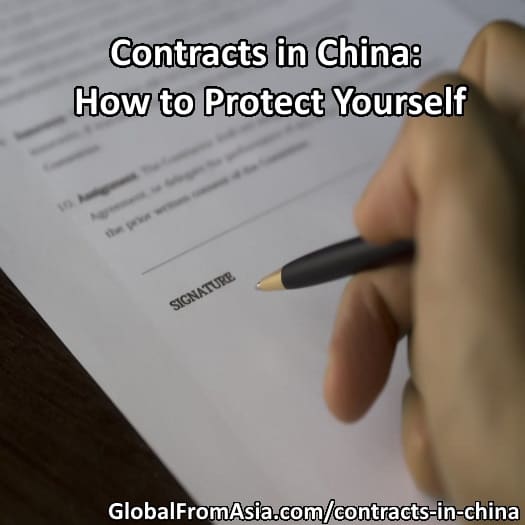
A contract is one of the essential parts of an effective agreement or business relationship; it simply seals the deal and safeguards both parties’ rights and interests, including backing up your claims in a dispute. Just like in any other country, contracts play a vital role in every transaction with a Chinese company.
According to a ranking calculated by the World Bank in Doingbusiness.org, China ranks 5th in the world for contract enforcement – this simply shows how serious the Chinese government is when it comes to contracts. On the other hand, there still are Chinese companies that ignore and violate contract terms – unfortunately, this mostly happens with foreigners. One reason Chinese tend to violate contracts with foreigners is because they believe foreigners won’t bother filing a lawsuit. In addition, if the contract isn’t written in Chinese, it can be unenforceable; hence, some Chinese companies take advantage. Although the law doesn’t really require to write the contract in Chinese, there are just some Chinese courts just don’t enforce English language contracts at all.
So, how do you write a contract in China? How can you protect yourself? If you want to know more, read on.
Writing Contracts in China

- Know who you are doing business with
This is pretty basic, but first things first, do your homework and research the company you are dealing with. Check its reputation, ask for references, visit the company, and ask for business licenses if you can. You should be familiar with the Chinese company on the interpersonal and organizational levels and verify the its credibility by looking at its past track records.
- Negotiation / Agreement
In negotiation, both parties involved must contribute ideas and suggestions to clarify each others’ rights, interests and obligations. Cooperation and proper communication is the key to implement an effective contract. It will be nice to negotiate and sign a contract in front of a group or any other person involved rather than just one negotiator, just to keep everyone informed about what has been agreed on.
A Few Key points to Negotiating:
- Don’t make promises you can’t keep
- Be respectful, gentle, and sincere to build a personal relationship with the guys across the table
- Discuss possible penalties, but not to the point you’ll scare them away
- Don’t rush the negotiation
- Hire a professional translator for better communication
- Be smart with dispute resolution
- Draft the contract with the help of a person with relevant legal expertise — this could be your trusted lawyer or someone from a foreign law firm representative office.
In accordance with the Chinese law, there must be a written contract between parties written in Chinese, but it may have translations. Based on the Contract Law of the People’s Republic of China, the following details must be indicated in the contract:
(1) designations or names and addresses of the parties;
(2) the targeted matter;
(3) quantity;
(4) quality;
(5) price or remuneration;
(6) time, place and mode of fulfillment;
(7) liability for breach of contract; and
(8) dispute settlement.
- Enforce the Contract
The enforcement process is relatively straightforward and transparent in major cities of China. There are three rules for drafting an effectively enforceable contract in China:
- Enforcement is in China through litigation in the Chinese court system.
- Governing law is Chinese law.
- Governing language is Chinese language.
(source)
- Keep an eye on the other party
Periodically, check out how your supplier abides with the contract’s terms and conditions. Should there be a breach of contract or a dispute, this contract will back you up if you need to file a lawsuit.
What happens when a Chinese company violates a contract?

First off, if there is any dispute involving a Chinese company, a lawsuit should be filed in a Chinese court.
Under the Contract Law of China, Chapter VII, Article 107: A party that fails to perform its obligations under the contract or fails to perform them as contracted shall bear the liability for breach of contract by continuing to perform the obligations, taking remedial measures, or compensating for losses.
Basically, the punishment or penalty for the Chinese company violating the contract depends on what the contract says, that is why you should anticipate the most likely and damaging dispute under the agreement and be smart with dispute resolutions to determine which is best for you.
Filing a lawsuit is indeed a major headache, and I hope it won’t happen to anyone of us! To avoid such headaches, it is essential that contracts are drafted well so both parties can benefit and avoid any disputes, hence improving business relationships.
